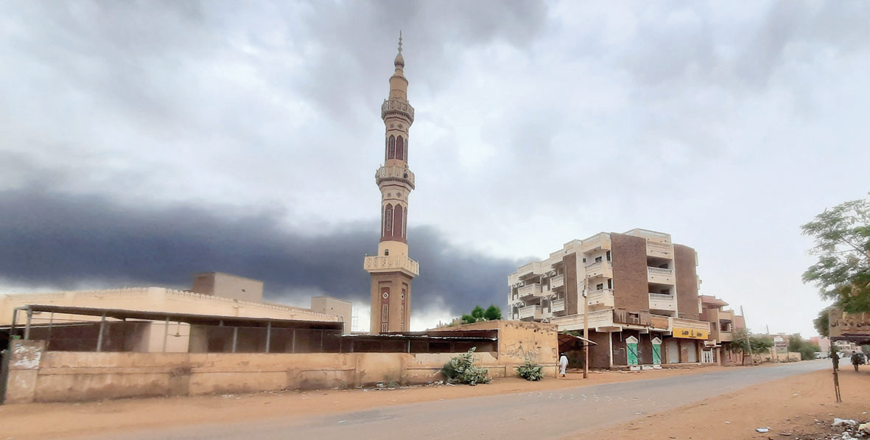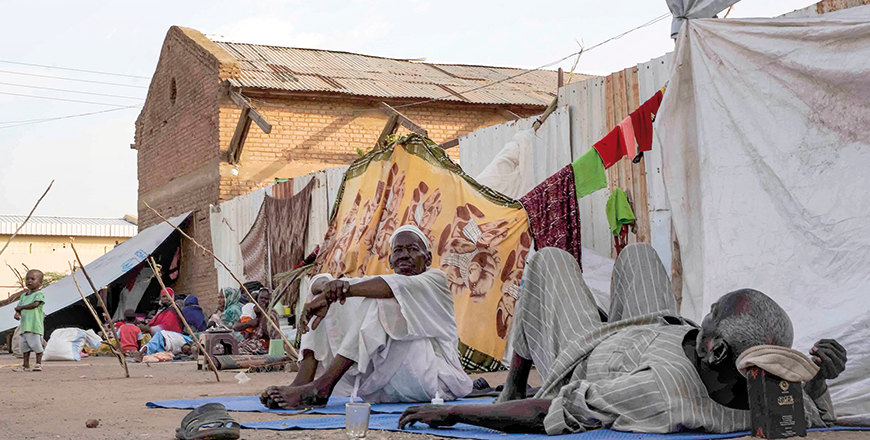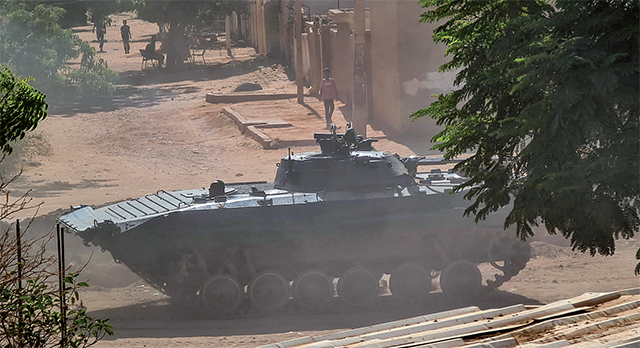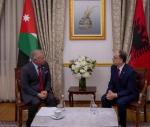You are here
Sudan ceasefire brings rare respite for Khartoum civilians
By AFP - Jun 10,2023 - Last updated at Jun 10,2023

Smoke rises above buildings behind a nearly deserted street in Khartoum on Saturday (AFP photo)
KHARTOUM — Khartoum residents reported a welcome lull in fighting in Sudan's capital on Saturday after a 24-hour ceasefire between two warring generals took effect, but few believed it would hold.
"Since the war started, this is the first time hours go by and we don't hear the sound of guns," said Hamed Ibrahim, adding that "today was completely different" in his east Khartoum neighbourhood.
Fighting has raged in the country since mid-April, when army chief Abdel Fattah Al Burhan and his former deputy Mohamed Hamdan Daglo, who commands the paramilitary Rapid Support Forces (RSF), turned on each other.
Multiple truces have been agreed and broken since the conflict flared, and Washington slapped sanctions on both rival generals after the last attempt collapsed at the end of May.
The air strikes and artillery bombardments that have rocked greater Khartoum almost daily subsided at least temporarily, allowing trapped civilians to venture outdoors to buy desperately needed supplies.
"Today we have witnessed a total calm," said Othman Hamed, a resident of the capital's sister city Omdurman, just across the Nile.
In one Khartoum market, people were seen scrambling to stock up on fruit and other basic goods.
"The truce is a chance for us to get some food supplies after we lived on rationed quantities in recent days," said one of the shoppers, Mohamad Radwan.
Hajar Youssef said she had gone out in search of an open pharmacy to buy insulin for her mother, who has diabetes. "Unfortunately, I did not find one."
Many people expressed disappointment that the promised ceasefire was so limited in scope.
"A one-day truce is much less than we aspire for," said Khartoum North resident Mahmud Bashir. "We look forward to an end to this damned war."
Fleeing Khartoum
Bus station employee Ali Issa said many people were using the truce to flee the capital for the relative safety of the provinces.
"Today, numbers... have risen significantly, maybe even doubled," he said.
In the conflict’s other main battleground, the western region of Darfur, there was no immediate word on observance of the ceasefire.
Upwards of 1,800 people have been killed in the fighting, according to the Armed Conflict Location and Event Data Project.
Nearly two million people have been displaced, including 476,000 who have sought refuge in neighbouring countries, the United Nations says.
Announcing the latest truce on Friday, US and Saudi mediators warned the warring parties they would break off their diplomatic efforts unless they honoured their commitments this time.
“Should the parties fail to observe the 24-hour ceasefire, facilitators will be compelled to consider adjourning” talks in the Saudi city of Jeddah which have been suspended since late last month, they said.
Sudan specialist Aly Verjee said he saw little reason why this truce should be any better than its predecessors.
“Unfortunately, the incentives have not changed for either party, so it’s hard to see that a truce with the same underlying assumptions, especially one of such short duration, will see a substantially different result,” said Verjee, a researcher at Sweden’s University of Gothenburg.
‘Confidence building’
The Saudi and US mediators said they “share the frustration of the Sudanese people about the uneven implementation of previous ceasefires”.
Both the army and the paramilitary RSF have declared their commitment to the latest truce, which they said could support humanitarian efforts, while cautioning against violations by their opponents.
“If observed, the 24-hour ceasefire will provide an important opportunity... for the parties to undertake confidence-building measures which could permit resumption of the Jeddah talks,” the US-Saudi statement said.
Friday’s ceasefire announcement came a day after Sudanese authorities loyal to Burhan declared UN envoy Volker Perthes “persona non grata”, accusing him of taking sides.
UN chief Antonio Guterres later expressed support for Perthes, who is currently in the Ethiopian capital Addis Ababa for talks.
Speaking through his spokesman, Guterres said “the doctrine of persona non grata is not applicable to or in respect of United Nations personnel.”
The fighting has sidelined Perthes’s efforts to revive Sudan’s transition to civilian rule, which was derailed by a 2021 coup by the two generals before they fell out.
It has also complicated the coordination of international efforts to deliver emergency relief to the 25 million civilians that the United Nations estimates are in need.
Related Articles
WAD MADANI, Sudan — The United Nations on Wednesday said nearly three months of war in Sudan have uprooted more than 3 million people, and c
KHARTOUM — Gunfire and explosions again rocked Sudan's capital on Monday, hours before a one-week humanitarian ceasefire was due to take eff
KHARTOUM — Heavy clashes again rocked Sudan's capital on Sunday hours after rival generals agreed to an upcoming one-week ceasefire, the lat



















